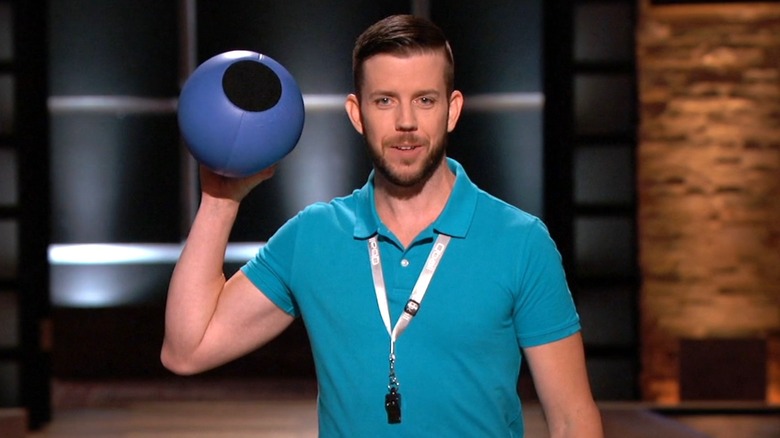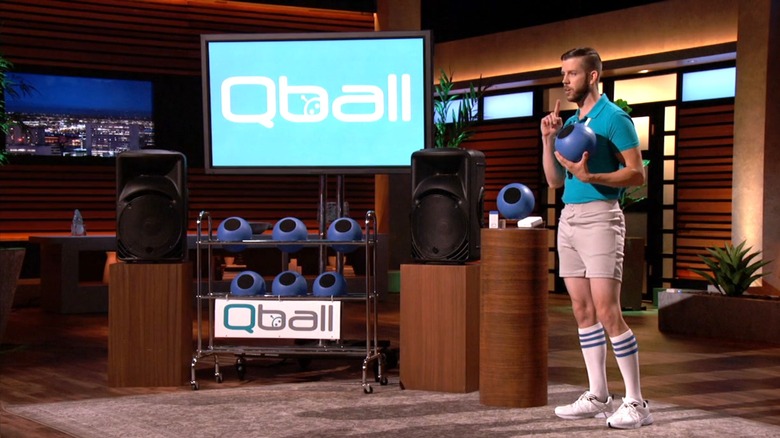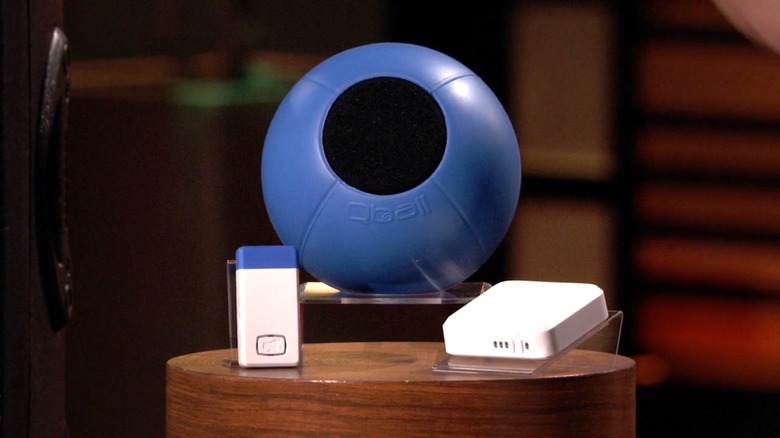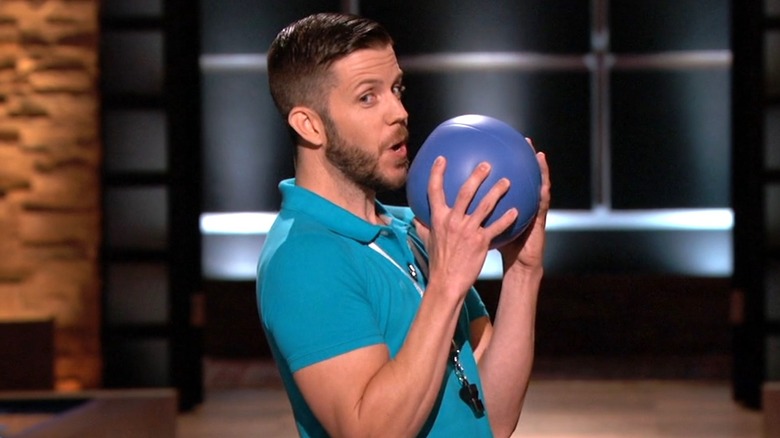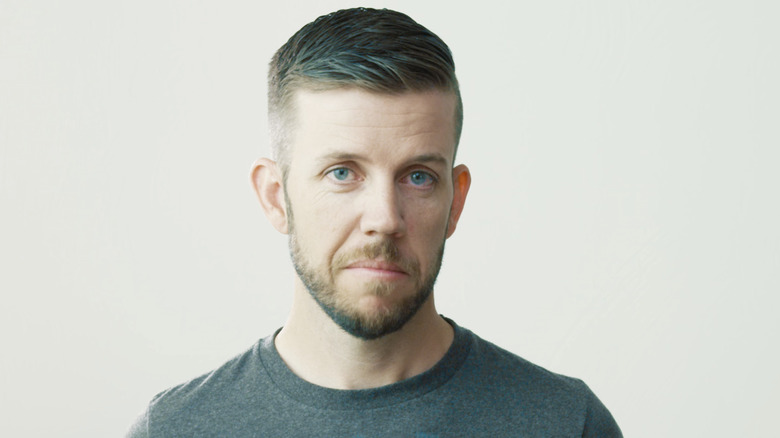What Happened To Qball Wireless Mic From Shark Tank Season 9?
We may receive a commission on purchases made from links.
On October 1, 2017, the second episode of the ninth season of "Shark Tank" premiered on ABC to approximately 5.1 million viewers. While that episode featured the notorious Trippie appp, one of the products pitched to the Sharks that week was the Qball, a wireless microphone in a throwable rubber ball. Explaining that the Qball was patent-pending, founder Shane Cox noted that his primary customer base was schools and that he had strong sales so far. He was quickly able to get a three-Shark offer, one that he took without giving a chance to the other Sharks.
In the six years since the episode first aired, Qball still has an active internet presence. But as other "Shark Tank" updates have shown, that can be deceiving. So, given a deeper look at where the company sits now and where the patent application went, let's see what exactly we can find out about a unique product that seems to have benefitted from the proverbial "Shark Tank effect."
What happened to Qball on Shark Tank?
Shane Cox entered "Shark Tank" seeking $200,000 for 15% equity in PeeQ Technologies, the parent company behind his product, the Qball. The Qball is a wireless microphone that comes in a throwable rubber ball, with the receiver having an aux output that can be plugged into almost any kind of sound system. As Cox explained, the Qball was primarily designed as both a classroom tool to help keep kids' attention and make it easier to hear teachers, particularly since auditory cognitive processing fully matures around 15 years old.
At the time, the Qball retailed for $179 with a manufacturing cost of $52, and he had done $177,000 in sales year-to-date at the time of shooting. (Based on the usual "Shark Tank" shooting schedule where the season would be shot in two separate "pods" in June and September, the episode was most likely shot in June 2017, meaning that was less than half a year's worth of sales.) Cox pegged about 90% of Qball sales as being to schools, with church groups and other public speakers making up the 10%, with his main marketing efforts being a booth at trade shows.
Robert Herjavec, citing his past issues with selling cybersecurity products to schools, opted out, but other Sharks were interested. Lori Greiner, Mark Cuban, and guest Shark Rohan Oza wanted to go in together, offering $200,000 for 30%. Barbara Corcoran showed interest in making her own deal but was rebuffed by Cox, given the three-Shark deal in play before making an offer. After Cox's counter-offer of dropping the equity to 25% was rejected, he agreed to the Sharks' original deal.
How did Qball do after Shark Tank?
During his "Shark Tank" pitch, Shane Cox mentioned having a patent pending on the Qball's ability to automatically put the microphone to sleep when it detects being thrown, meaning that the mic doesn't pick up noise when it's thrown. That patent, which he applied for over a year before his "Shark Tank" appearance, was eventually granted in September 2018. He was granted a second patent in February 2021 for indicator lights on the Qball.
Not long after getting that first patent, Cox was interviewed by GrepBeat about his "Shark Tank" experience, during which he detailed some of the aftermath, including how involved his Sharks were with Qball. "They're not afraid to express their opinion," he said. "If I tell them an idea and they don't think that it's a good one, they'll let me know. That's important because you don't just want a 'yes' man. [...] Their involvement is really as much as I want them involved. It's great from an entrepreneur perspective because I didn't want someone to come in and run my business for me, and I don't think that's what they want either."
Cox added that since "Shark Tank," he had expanded his office space and hired more support staff, thanks in large part to having already doubled his 2017 sales as of October 2018.
Are Qball and PeeQ Technologies still in business?
PeeQ Technologies' website for Qball is still functional and taking orders, and its social media pages are still updated regularly. By all appearances, this is a fully functioning business. In fact, Shark Tank Recap reported in 2024 that the company was worth over $1 million in annual revenue.
Shane Cox has updated the product line to make it better, though. The base Qball is now the Qball+, which adds USB audio device functionality to the receiver, greatly increasing the utility of the product. It currently goes for $129 on the Qball site and $149 on Amazon.
If you feel like spending a little more, you can opt for the Qball Pro, which adds the ring light described in Shane Cox's second Qball patent. This ring light changes color depending on the Qball's status — it's green when the mic is active, red when the mic is muted, white with small red dots when charging, and blue when sleeping. In addition to the Qball site, you can also find the Qball Plus on Amazon.
The Qball store also sells replacement microphone windscreens, various colors of $25 Qball covers, an $89 Qball sterilizer, and a bundle of all of the above.
What's next for PeeQ Technologies' founder?
Qball inventor Shane Cox seemingly keeps a low profile these days. His only public-facing social media page is his LinkedIn page, and it doesn't say much of anything beyond indicating that he's still the Chief Executive Officer at PeeQ Technologies. All of PeeQ's social media pages are Qball-centric, and he's not out in front as a spokesman on them.
Google and news archive searches for interviews, guest columns, and the like don't show anything for Cox since 2018. It seems like his priority is staying behind the scenes to run PeeQ, and by all indications, he's doing a good job with it. Those last significant updates were five years ago, though, so we can't say for sure if Robert Herjavec was right or wrong that the business was not scaleable to the point it would show significant returns for the Sharks who invested in it. However, the Qball site does offer grant resources for educators hoping to acquire this unique type of microphone, so it appears the company is doing well and doing good in the world.
"Shark Tank" is available for purchase on Prime Video.
